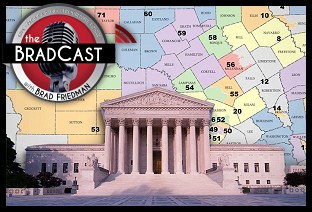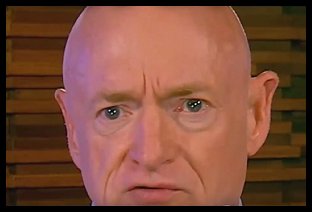During yesterday morning's contentious hearings in the House Judiciary subcommittee, featuring DoJ Voting Chief, John "Minorities Die First" Tanner, a staffer in that division who we've come to know contacted The BRAD BLOG to say "Tanner is lying through his teeth."
We asked the staffer --- who has requested to remain "anonymous" for obvious reasons --- to elucidate with details, which are now posted in full below...
We in the Voting Section were amazed to watch John Tanner's evasion and prevarication. He lost no time in twisting the truth. In his opening statement, he gives his usual litany about all the suits the [DoJ Civil Rights Division Voting] Section has filed. A huge percentage of them have been meaningless, the kinds of suits that never would have been filed under previous leadership. In the past, the Section Chief would pick up the phone, call the jurisdiction, and the jurisdiction would change its procedures. Only truly intransigent jurisdictions got sued. Now, the protocol is that even if we negotiate with the jurisdiction, we sue them, and many times, a previously negotiated consent decree is filed with the court the very same day the complaint is filed. The only possible justification for doing this is to pad the numbers of lawsuits we're filing.
Tanner says "The Section is so productive because of the energy, the enthusiasm, and the commitment of the Section staff." At this point, the only thing that the Section staff could conceivably be said to be energetic and enthusiastic about and committed to is the departure of John Tanner and his handpicked acting deputies, Susana Lorenzo-Giguere and Yvette Rivera. Tanner's ineptitude has done something most of the committed supporters of civil rights in the Section never thought possible: it's given us common cause with people across the aisle. We disagree with their ideology, but as one of them told me only today, Tanner has few supporters even over there. We are united in our belief in their inability to manage the Section. Aside from this, morale is at an ebb that even falls below that which existed when Hans von Spakovsky and Brad Schlozman ran roughshod over the Section.
The letter continues below...
Tanner said that the constitutional poll tax question was outside the scope of Section 5 review. This is plain wrong. A poll tax would still violate Section 5 if it could be shown that the poll tax disproportionately impacted minority voters. Since minority voters often have lower incomes (as Tanner might say, "the math is just as such"), this wouldn't have been difficult. In fact, the memorandum produced by Berman, Moore, Zubrensky, and Moss noted the cost element and the poll tax element as reasons for objection (see page 30 of the memorandum [PDF]).
Congresswoman Wasserman Schultz pressed Tanner on the Missouri NVRA list maintenance case. Tanner denied that the primary purpose of the suit was to purge Missouri's voter rolls. That's hogwash. Missouri was about purging, and later, Tanner sent letters to over 10 states trying to make them purge as well.
But his worst prevarication came in several questions from Congressman Scott. Tanner said that in Georgia, the court found an absence of racial discrimination, and the case was dismissed. As Moore pointed out, the court found nothing of the sort. However, by the time the court even issued its final ruling, the statute that was in front of it was not the one that Tanner precleared in 2005. The one Tanner precleared in 2005 was found unconstitutional as a poll tax, plain and simple. Georgia then rewrote the statute to provide free IDs to anyone who requested one, and the case was then dismissed, primarily because of lack of standing --- Common Cause, the ACLU, and the Lawyers Committee were unable to find anybody who couldn't get a photo ID to serve as a plaintiff in the case.
This is a recurring problem with the photo ID laws. There are lots of people who can't get IDs, but if you can get somebody to the courthouse to be a plaintiff, you can probably get them to the ID office. The folks who can't get IDs are so marginalized --- a lot of them are in nursing homes --- that you wouldn't be able to get them to the courthouse to serve as plaintiffs. But in any case, Tanner misrepresented which case was dismissed. Tanner said that in the first case, the court "rejected" the racial discrimination claim. That is not correct. The court didn't reach the racial discrimination claim, because it found that the law was an unconstitutional poll tax.
Tanner said he didn't know how long Bob Berman, Amy Zubrensky, Toby Moore, and Heather Moss had been working in the Voting Section. Tanner and Berman worked together for many years, so he had to have known. Heather came when Tanner was already back in the Section, so he had to know when she arrived as well. And surely he knew how long his political geographer and one of his lawyers had been in the Section. It's simply not credible that Tanner did not know these basic facts about his own personnel.
Joshua Rogers [the only one of five section staffers to recommend preclearance of the 2005 George Photo ID law] arrived while Tanner was there. Tanner put Rogers on the Georgia team. Tanner said he didn't know how long Rogers had been there. This is not believable.
Tanner was asked if his "division" had had an awards ceremony where everybody but two received an award. He said no. The truth is that of the analysts in the Section 5 unit of the Voting Section, all but two did receive awards. The only two who did not receive them happened to be the only two African-American analysts left after Yvette Rivera, Tanner's handpicked acting deputy, drove the rest of them, constituting over 100 years of Section 5 experience, out of the Section.
Tanner said that the other staff members (Berman, Zubrensky, Moore, and Moss) were not reprimanded after they disagreed with Georgia. In fact, as Moore said later, they were indeed reprimanded. What's worse, they were driven out of the Voting Section, and Moore was frivolously investigated by the Office of Professional Responsibility, an investigation that turned up no evidence of wrongdoing.
This is Tanner's vindictive modus operandi. Not a one of the four of them is still with the Section. Berman was transferred to what Senator Kennedy has called a "dead-end training job." Moore left because he was afraid his performance appraisal would be doctored. Moss was, incredibly, refused a schedule modification so she could work part-time while going to law school--at a time when the Section was already short of analyst staff (the shortage is now past the critical point, while Yvette Rivera continues to burden analysts with meaningless make-work requirements).


 SCOTUS Ruling a How-To for Unlawful Gerrymandering on 'Eve' of Critical Election Year: BradCast' 12/17/25
SCOTUS Ruling a How-To for Unlawful Gerrymandering on 'Eve' of Critical Election Year: BradCast' 12/17/25 Bricks in the Wall:
Bricks in the Wall: 'Green News Report' 12/16/25
'Green News Report' 12/16/25
 'This One Goes to 11': Weekend of Violence, Tragic Murder of Rob Reiner: 'BradCast' 12/15
'This One Goes to 11': Weekend of Violence, Tragic Murder of Rob Reiner: 'BradCast' 12/15 Sunday 'WTF?' Toons
Sunday 'WTF?' Toons Trump Now Losing One
Trump Now Losing One 'Green News Report' 12/11/25
'Green News Report' 12/11/25 Dems Continue Stunning 2025 Election Streak: 'BradCast' 12/10/25
Dems Continue Stunning 2025 Election Streak: 'BradCast' 12/10/25 Petrostates and Propagandists Undermining Climate Science: 'BradCast' 12/9/25
Petrostates and Propagandists Undermining Climate Science: 'BradCast' 12/9/25 'Green News Report' 12/9/25
'Green News Report' 12/9/25 The High Cost of Trump's Terrible Policy Making: 'BradCast' 12/8/25
The High Cost of Trump's Terrible Policy Making: 'BradCast' 12/8/25 Sunday 'All in a Day's Work' Toons
Sunday 'All in a Day's Work' Toons Dems Fight to Avoid the GOP's Massive, Year-End Health Care Cliff: 'BradCast' 12/4/25
Dems Fight to Avoid the GOP's Massive, Year-End Health Care Cliff: 'BradCast' 12/4/25 'Green News Report' 12/4/25
'Green News Report' 12/4/25 A 'Flashing Red Warning Sign' for GOP: 'BradCast' 12/3/25
A 'Flashing Red Warning Sign' for GOP: 'BradCast' 12/3/25 Hegseth, War Crimes and DoD's 'Politicization Death Spiral': 'BradCast' 12/2/25
Hegseth, War Crimes and DoD's 'Politicization Death Spiral': 'BradCast' 12/2/25 Follow the
Follow the  With Thanks, No Kings and Good Cheer
With Thanks, No Kings and Good Cheer Presidential Illegality and Duty to Disobey
Presidential Illegality and Duty to Disobey President of United States Calls for Killing Democratic Officials: 'BradCast' 11/20/25
President of United States Calls for Killing Democratic Officials: 'BradCast' 11/20/25 Is MAGA Finally Beginning to Fall Apart?: 'BradCast' 11/19/25
Is MAGA Finally Beginning to Fall Apart?: 'BradCast' 11/19/25 Trump's Terrible, Horrible, No Good, Very Bad Week: 'BradCast' 11/18/25
Trump's Terrible, Horrible, No Good, Very Bad Week: 'BradCast' 11/18/25
 VA GOP VOTER REG FRAUDSTER OFF HOOK
VA GOP VOTER REG FRAUDSTER OFF HOOK Criminal GOP Voter Registration Fraud Probe Expanding in VA
Criminal GOP Voter Registration Fraud Probe Expanding in VA DOJ PROBE SOUGHT AFTER VA ARREST
DOJ PROBE SOUGHT AFTER VA ARREST Arrest in VA: GOP Voter Reg Scandal Widens
Arrest in VA: GOP Voter Reg Scandal Widens ALL TOGETHER: ROVE, SPROUL, KOCHS, RNC
ALL TOGETHER: ROVE, SPROUL, KOCHS, RNC LATimes: RNC's 'Fired' Sproul Working for Repubs in 'as Many as 30 States'
LATimes: RNC's 'Fired' Sproul Working for Repubs in 'as Many as 30 States' 'Fired' Sproul Group 'Cloned', Still Working for Republicans in At Least 10 States
'Fired' Sproul Group 'Cloned', Still Working for Republicans in At Least 10 States FINALLY: FOX ON GOP REG FRAUD SCANDAL
FINALLY: FOX ON GOP REG FRAUD SCANDAL COLORADO FOLLOWS FLORIDA WITH GOP CRIMINAL INVESTIGATION
COLORADO FOLLOWS FLORIDA WITH GOP CRIMINAL INVESTIGATION CRIMINAL PROBE LAUNCHED INTO GOP VOTER REGISTRATION FRAUD SCANDAL IN FL
CRIMINAL PROBE LAUNCHED INTO GOP VOTER REGISTRATION FRAUD SCANDAL IN FL Brad Breaks PA Photo ID & GOP Registration Fraud Scandal News on Hartmann TV
Brad Breaks PA Photo ID & GOP Registration Fraud Scandal News on Hartmann TV  CAUGHT ON TAPE: COORDINATED NATIONWIDE GOP VOTER REG SCAM
CAUGHT ON TAPE: COORDINATED NATIONWIDE GOP VOTER REG SCAM CRIMINAL ELECTION FRAUD COMPLAINT FILED AGAINST GOP 'FRAUD' FIRM
CRIMINAL ELECTION FRAUD COMPLAINT FILED AGAINST GOP 'FRAUD' FIRM RICK SCOTT GETS ROLLED IN GOP REGISTRATION FRAUD SCANDAL
RICK SCOTT GETS ROLLED IN GOP REGISTRATION FRAUD SCANDAL VIDEO: Brad Breaks GOP Reg Fraud Scandal on Hartmann TV
VIDEO: Brad Breaks GOP Reg Fraud Scandal on Hartmann TV RNC FIRES NATIONAL VOTER REGISTRATION FIRM FOR FRAUD
RNC FIRES NATIONAL VOTER REGISTRATION FIRM FOR FRAUD EXCLUSIVE: Intvw w/ FL Official Who First Discovered GOP Reg Fraud
EXCLUSIVE: Intvw w/ FL Official Who First Discovered GOP Reg Fraud GOP REGISTRATION FRAUD FOUND IN FL
GOP REGISTRATION FRAUD FOUND IN FL

































